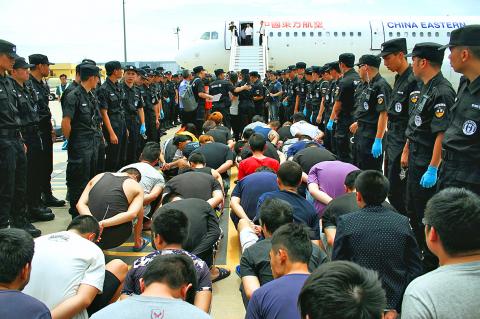Beijing yesterday rejected Taiwan’s protest over Cambodia handing over Taiwanese fraud suspects to Chinese authorities, saying for the first time that the cross-strait communications mechanism “has been suspended” since the new government took office in Taipei last month.
China’s Taiwan Affairs Office spokesperson An Fengshan (安峰山) made the remark while answering reporters’ questions about Taipei’s protest over Cambodia’s decision to accept Beijing’s demand and send Taiwanese telecommunications fraud suspects to China for prosecution.
The mechanism for contact and communication between China and Taiwan “has been suspended” since May 20, as Taipei has not recognized the so-called “1992 consensus,” which he said is the foundation for cross-strait relations that embodies the “one China” principle.

Photo: AFP/STR
Beijing has repeatedly said that the new government of President Tsai Ing-wen (蔡英文) must accept the “1992 consensus” for what it called the warm bilateral ties over the past eight years to continue.
The “1992 consensus” refers to a tacit understanding reached during cross-strait talks in 1992 that both Taiwan and China acknowledge that there is “one China,” with each side having its own interpretation of what that means. In 2006, former Mainland Affairs Council chairman Su Chi (蘇起) admitted he made up the term in 2000, before the Chinese Nationalist Party (KMT) handed power to the Democratic Progressive Party.
Efforts to fight telecom fraud and to protect the rights of victims have won the support of people in both China and Taiwan, An said.
He said that there were 25 Taiwanese in the group of 39 suspects sent to China on Friday, although earlier reports indicated that the group sent to Wenzhou in Zhejiang Province included 18 Taiwanese.
An’s comments came after the Mainland Affairs Council issued a statement on Friday voicing regret and protesting China’s failure to respect the appeal by Taiwan that no more Taiwanese suspects should be sent to China until the two sides can work out a set of principles on how to handle such issues.
Taipei has come under domestic pressure and has tried to prevent Taiwanese arrested overseas from being deported to China, although that pressure has eased after revelations that tens of thousands of Taiwanese, many of whom operate abroad to avoid detection, might be engaging in fraud targeting not only Chinese, but Taiwanese as well.
Dozens of Taiwanese fraud suspects were extradited from Kenya to China through Malaysia earlier this year, triggering an angry response.
As of press time last night, no response was available from the Mainland Affairs Council on An’s remarks.

Taiwan is projected to lose a working-age population of about 6.67 million people in two waves of retirement in the coming years, as the nation confronts accelerating demographic decline and a shortage of younger workers to take their place, the Ministry of the Interior said. Taiwan experienced its largest baby boom between 1958 and 1966, when the population grew by 3.78 million, followed by a second surge of 2.89 million between 1976 and 1982, ministry data showed. In 2023, the first of those baby boom generations — those born in the late 1950s and early 1960s — began to enter retirement, triggering

ECONOMIC BOOST: Should the more than 23 million people eligible for the NT$10,000 handouts spend them the same way as in 2023, GDP could rise 0.5 percent, an official said Universal cash handouts of NT$10,000 (US$330) are to be disbursed late next month at the earliest — including to permanent residents and foreign residents married to Taiwanese — pending legislative approval, the Ministry of Finance said yesterday. The Executive Yuan yesterday approved the Special Act for Strengthening Economic, Social and National Security Resilience in Response to International Circumstances (因應國際情勢強化經濟社會及民生國安韌性特別條例). The NT$550 billion special budget includes NT$236 billion for the cash handouts, plus an additional NT$20 billion set aside as reserve funds, expected to be used to support industries. Handouts might begin one month after the bill is promulgated and would be completed within

The National Development Council (NDC) yesterday unveiled details of new regulations that ease restrictions on foreigners working or living in Taiwan, as part of a bid to attract skilled workers from abroad. The regulations, which could go into effect in the first quarter of next year, stem from amendments to the Act for the Recruitment and Employment of Foreign Professionals (外國專業人才延攬及僱用法) passed by lawmakers on Aug. 29. Students categorized as “overseas compatriots” would be allowed to stay and work in Taiwan in the two years after their graduation without obtaining additional permits, doing away with the evaluation process that is currently required,

NO CHANGE: The TRA makes clear that the US does not consider the status of Taiwan to have been determined by WWII-era documents, a former AIT deputy director said The American Institute in Taiwan’s (AIT) comments that World War-II era documents do not determine Taiwan’s political status accurately conveyed the US’ stance, the US Department of State said. An AIT spokesperson on Saturday said that a Chinese official mischaracterized World War II-era documents as stating that Taiwan was ceded to the China. The remarks from the US’ de facto embassy in Taiwan drew criticism from the Ma Ying-jeou Foundation, whose director said the comments put Taiwan in danger. The Chinese-language United Daily News yesterday reported that a US State Department spokesperson confirmed the AIT’s position. They added that the US would continue to